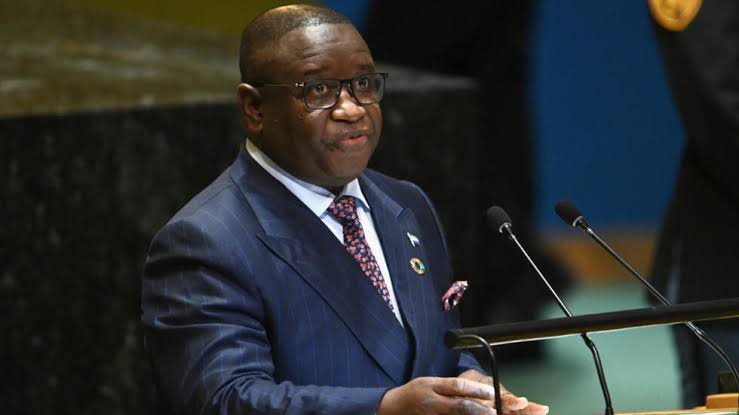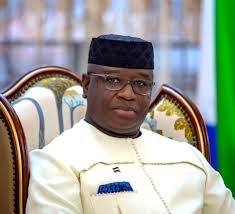Sierra Leone’s President Julius Maada Bio was chosen yesterday, Sunday to be the next chairman of the West African economic bloc, ECOWAS.
The Economic Community of West African States, known as ECOWAS, was founded in 1975, and is facing challenges due to rising violence, member departures and economic disturbances.
In a statement following Sunday’s announcement, Bio promised to prioritize democracy, security cooperation, economic integration and institutional credibility.
“We are still confronting insecurity in the Sahel and coastal states, terrorism, political instability, illicit arms flow, and transnational organized crimes continue to test the resilience of our nations and the effectiveness of our institutions,” he said.
Bio is currently serving his second term as president of Sierra Leone after a contested election two years ago in the coastal West African country. He was president when ECOWAS imposed severe sanctions on Niger following a coup two years ago. Niger cited the sanctions as one of the reasons for leaving the bloc. Sierra Leone was one of the countries that supported a military intervention in the country in 2023.
At home, Bio is facing an ongoing synthetic drug crisis and a stagnating economy.
Bio’s new position comes as the region faces its most severe crisis in decades, with jihadist forces controlling vast swaths of the Sahel, a semi-arid region south of the Sahara.
In the past few years, ECOWAS has struggled with the departure of Mali, Burkina Faso and Niger which have all faced military coups. All three junta left the bloc and created their security partnership, the Alliance of Sahel States. They have cut ties with the traditional Western allies, ousting French and American military forces, and instead sought new security ties with Russia.
The three countries have been the hardest hit by jihadist violence in recent years.
About President Julius Maada Bio

Julius Maada Wonie Bio (born 12 May 1964) is a Sierra Leonean politician and former army officer who has served as the 5th president of Sierra Leone since 4 April 2018. He is a retired brigadier in the Sierra Leone Army and was the military head of state of Sierra Leone from 16 January 1996 to 29 March 1996, at only 32 years old in a military junta government known as the National Provisional Ruling Council (NPRC).
As military head of state, Bio returned Sierra Leone to a democratically elected government, when he handed power to Ahmad Tejan Kabbah of the Sierra Leone People’s Party, following Kabbah’s victory in the 1996 Sierra Leonean presidential election. Upon retiring from the military in 1996, Bio moved to the United States, where he was granted political asylum, and he did not visit Sierra Leone from the U.S. until 2005.
Bio ran as the Sierra Leone People’s Party (SLPP) presidential candidate in the 2012 presidential election, but lost to incumbent President Ernest Bai Koroma. He ran again in 2018, defeating Samura Kamara of the ruling All People’s Congress (APC).
As president, Bio has overturned most of the policies of Koroma, whom he accuses of corruption and mismanagement of the country’s treasury. A deadly coup attempt to overthrow Bio failed in September 2023. Former president Koroma was detained and charged with treason as he was accused of being involved in the failed coup attempt.
Bio’s government’s handling of the economy was the target of a violent protest in August 2022. Bio was nevertheless re-elected the following year, though the elections were marred by violence and raised concern from international observers due to a lack of transparency in the counting process. As president, Bio has implemented free primary and secondary school public education and repealed the death penalty.
For President Bio, Purpose-driven leadership, love for people and servant leadership has been at the heart of his leadership trajectory. President Bio has been consistent from cradle to full bloom, and his leadership inspiration has continued to shine as the northern star.
The past five years have been another testament to his fidelity to service. The first test of leadership and public-spirited demeanour came when he took over power on 16th January 1996, as the Military head of state, and kept his word of organizing elections and handing over power to a democratically elected president – resisting pressures from contemporaries to act against his conviction. Happening at the time when military coups were in fashion in West Africa makes his decision all the more riveting.
In 2018, in pursuit of a better life for the millions of Sierra Leoneans, President Julius Maada Bio led the opposition Sierra Leone People’s Party (SLPP) to upstage the ruling party and emerge as the democratically elected President of the country. Five years on, he has performed creditably – scoring high in major development indices as put forward in the New Direction Agenda, amidst global economic headwinds occasioned by COVID-19 and the Russia-Ukraine War.
In presenting his Government’s agenda at the time, President Bio maintained that the choice before the country was between the current’ Business as Usual Status Quo’ of the APC that has converted Sierra Leone into a land of poverty, rampant corruption, gross indiscipline and underdevelopment and the SLPP’s New Direction’s promise of Change and Transformation that will make Sierra Leone a significantly better country through inclusive politics, inclusive economic growth, inclusive development and inclusive governance.
True to his words, the New Direction Agenda has invested more in building people as the most significant resources of the country.
The Global African Times wishes His Excellency President Julius Maada Bio a successful tenure as ECOWAS Chair.
Additional Sources: CBS42, Africa News, Wikipedia




